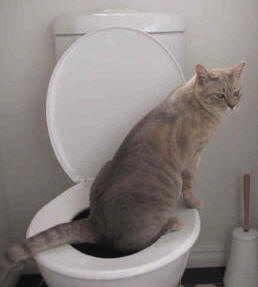Avoid Plumbing Problems: Never Flush Cat Poop Down Your Toilet - Expert Guidance
Avoid Plumbing Problems: Never Flush Cat Poop Down Your Toilet - Expert Guidance
Blog Article
They are making a number of great pointers related to Can You Flush Cat Poop Down The Toilet? in general in this article which follows.

Intro
As pet cat owners, it's vital to bear in mind just how we dispose of our feline close friends' waste. While it may appear hassle-free to flush feline poop down the bathroom, this practice can have harmful effects for both the environment and human health and wellness.
Alternatives to Flushing
The good news is, there are more secure and a lot more accountable methods to throw away feline poop. Consider the following options:
1. Scoop and Dispose in Trash
The most typical approach of taking care of pet cat poop is to scoop it right into a biodegradable bag and toss it in the trash. Be sure to use a specialized trash scoop and throw away the waste without delay.
2. Usage Biodegradable Litter
Go with eco-friendly feline litter made from products such as corn or wheat. These litters are environmentally friendly and can be safely disposed of in the trash.
3. Bury in the Yard
If you have a lawn, take into consideration hiding pet cat waste in a designated area far from vegetable gardens and water resources. Be sure to dig deep sufficient to prevent contamination of groundwater.
4. Install a Pet Waste Disposal System
Purchase an animal garbage disposal system specifically developed for feline waste. These systems use enzymes to break down the waste, lowering odor and ecological impact.
Wellness Risks
In addition to environmental worries, flushing pet cat waste can additionally present health and wellness risks to people. Cat feces may consist of Toxoplasma gondii, a bloodsucker that can trigger toxoplasmosis-- a potentially extreme disease, specifically for pregnant females and individuals with weakened body immune systems.
Ecological Impact
Flushing feline poop introduces harmful microorganisms and bloodsuckers right into the water, posturing a considerable threat to marine environments. These impurities can adversely impact aquatic life and concession water quality.
Final thought
Liable animal possession prolongs past providing food and shelter-- it additionally entails correct waste management. By avoiding flushing feline poop down the commode and going with alternate disposal methods, we can minimize our ecological impact and protect human health.
Why Can’t I Flush Cat Poop?
It Spreads a Parasite
Cats are frequently infected with a parasite called toxoplasma gondii. The parasite causes an infection called toxoplasmosis. It is usually harmless to cats. The parasite only uses cat poop as a host for its eggs. Otherwise, the cat’s immune system usually keeps the infection at low enough levels to maintain its own health. But it does not stop the develop of eggs. These eggs are tiny and surprisingly tough. They may survive for a year before they begin to grow. But that’s the problem.
Our wastewater system is not designed to deal with toxoplasmosis eggs. Instead, most eggs will flush from your toilet into sewers and wastewater management plants. After the sewage is treated for many other harmful things in it, it is typically released into local rivers, lakes, or oceans. Here, the toxoplasmosis eggs can find new hosts, including starfish, crabs, otters, and many other wildlife. For many, this is a significant risk to their health. Toxoplasmosis can also end up infecting water sources that are important for agriculture, which means our deer, pigs, and sheep can get infected too.
Is There Risk to Humans?
There can be a risk to human life from flushing cat poop down the toilet. If you do so, the parasites from your cat’s poop can end up in shellfish, game animals, or livestock. If this meat is then served raw or undercooked, the people who eat it can get sick.
In fact, according to the CDC, 40 million people in the United States are infected with toxoplasma gondii. They get it from exposure to infected seafood, or from some kind of cat poop contamination, like drinking from a stream that is contaminated or touching anything that has come into contact with cat poop. That includes just cleaning a cat litter box.
Most people who get infected with these parasites will not develop any symptoms. However, for pregnant women or for those with compromised immune systems, the parasite can cause severe health problems.
How to Handle Cat Poop
The best way to handle cat poop is actually to clean the box more often. The eggs that the parasite sheds will not become active until one to five days after the cat poops. That means that if you clean daily, you’re much less likely to come into direct contact with infectious eggs.
That said, always dispose of cat poop in the garbage and not down the toilet. Wash your hands before and after you clean the litter box, and bring the bag of poop right outside to your garbage bins.
https://trenchlesssolutionsusa.com/why-cant-i-flush-cat-poop/

I was shown that write-up on Can You Flush Cat Poop Down The Toilet? through a good friend on another website. Are you aware of anybody else who is fascinated with the topic? Why not promote it. Bless you for your time. Visit again soon.
Visit Our Website Report this page